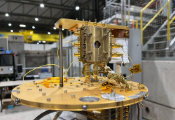Quandela’s Pilot Line Launch: A New Semiconductor Manufacturing Site
Quandela, the European-based quantum computing provider, inaugurates its first manufacturing pilot line for high-performance photonic qubit devices, aiming to accelerate the deployment of error-corrected quantum computers. Following the successful opening of its first quantum computer factory in June 2023, which already enabled the delivery of two quantum computers to industrial customers, this new production site underscores Quandela’s commitment to industrial scaling and innovation in the quantum computing sector.
To build quantum computers at scale, Quandela employs a pioneering approach that combines integrated photonics technology with semiconductor quantum dot-based devices, serving as both spin qubits and photon generators. This technology is rooted in twenty years of top-class scientific research conducted within French telecom laboratories and the French National Research Institute CNRS. The know-how was transferred to Quandela in 2017, and packaged devices have been commercialized since 2018.
The new manufacturing plant combines this extensive know-how with industrial machines and processes to boost the manufacturability and performance of the qubit devices. It is located at The Photovoltaic Institute of Île-de-France (IPVF), at the heart of the innovation hub of Paris-Saclay (FR), within a vibrant scientific and industrial community.
This is the first manufacturing plant entirely dedicated to such technology worldwide, marking a key milestone in the continued development of Quandela’s groundbreaking technology. The pilot line effectively opens a new phase that will propel this quantum technology into the industrialization phase and expand its integration into quantum systems for computing, networking, and communication.
Key Features of This New Manufacturing Plant
Production Throughput: For the upcoming two years, the pilot line is expected to produce more than two thousand devices per year. At full capacity, it is projected to reach 10,000 devices per year, with qubit device density increasing to hundreds of devices per mm².
Qubits Identification Tool: This novel machine permits testing of qubit properties, such as coherence time, at cryogenic temperatures in just a few minutes, selecting the most performant qubits for further processing. By probing the quantum properties of hundreds of nanometer-sized structures and collecting high-volume data while mapping uniformity, this method provides fast feedback to optimize the fabrication process. This leads to high yield (from 40% to over 70%) and low process variation (increased uniformity over thousands of devices on a cm² area).




































